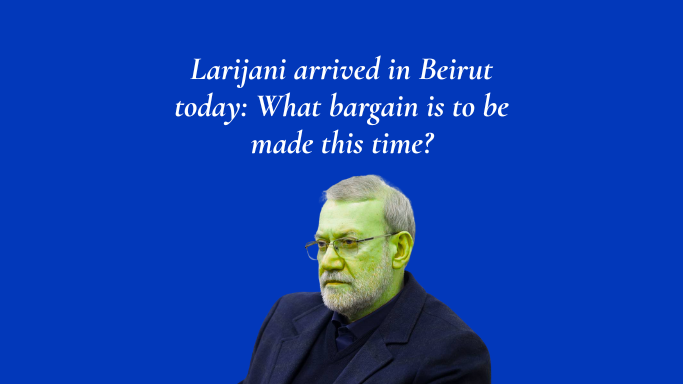


Larijani arrived in Beirut today: What bargain is to be made this time?
August 13, 2025
A-
A+
Secretary of Iran’s Supreme National Security Council Ali Larijani arrived at Beirut’s Rafic Hariri International Airport today. He was received by representatives from the Lebanese Foreign Ministry, Parliament Speaker Nabih Berri’s office, Hezbollah, Amal Movement, and the Islamic Jihad. In line with the visit, Hezbollah supporters lined the airport road with Iranian and Hezbollah flags as well as portraits of Larijani and Iran’s ailing Supreme Leader Khamenei. The reception was significant, partly due to Iran’s enduring influence in Lebanon following Israel’s decapitating war against Hezbollah and the Lebanese government’s recent decree to disarm the movement.
Larijani pledged that Iran will “stand by the Lebanese people under all circumstances and defend the country’s supreme interests.” However, to the anti-Hezbollah crowd, this translates as Iran doing whatever it can to ensure Hezbollah’s survival so that its influence in Lebanon remains intact. Larijani also stated that “Iran does not interfere in Lebanese internal affairs” and does not want to create a “rift” in relations between the two countries. This contradicts previous stances from Iran’s Supreme Council criticizing the disarmament of Hezbollah. In addition, Larijani said after meeting Parliament Speaker Nabih Berri that “Iran’s policy is based on the principle that the independent countries of the region must be strong and powerful” which also contradicts with Iran’s continuous funding of Hezbollah through illegal and smuggling networks which have aided the Shiite group in controlling the Lebanese state since the election of President Michel Aoun in 2016.
The visit comes amid heightened tensions between the current Lebanese government and Iran over comments by Iranian Foreign Minister Abbas Aragchi stating that “the Lebanese government’s plan to dismantle Hezbollah’s weapons will fail.” Anti-Hezbollah parties such as the Lebanese Forces and the Kataeb Party denounced the visit, calling it an infringement on Lebanon’s sovereignty, a charge that, if we are honest, is not far-fetched. The large-scale public reception was not only a show of strength to antagonize Hezbollah’s domestic opponents but also a message to Washington and Tel Aviv that Iran retains strong influence in Lebanon and stands firmly behind Hezbollah.
What does this mean?
The visit is part photo-op and part maneuver to protect what remains of Hezbollah’s arsenal. Building on my analysis from the latest Israel–Iran war, Iran still views Hezbollah as its first line of defense against Israel. The decapitation of Hezbollah and the killing of Nasrallah is what emboldened Israel to attack Tehran with U.S. backing. For Iran, retaining Hezbollah in Lebanon is a matter of national security.
This maneuver is risky, as it increases pressure on Lebanese President Joseph Aoun and Prime Minister Nawwaf Salam to enforce the cabinet’s decision to disarm the group. Combined with U.S. and international diplomatic pressure, as well as ongoing Israeli airstrikes, assassinations, and targeted village demolitions, the Lebanese government faces an increasingly precarious situation.
Hezbollah does not see its arsenal as something to bargain over. I have no doubt the group will not simply hand over its weapons to the Lebanese Army. Hezbollah’s arsenal does not truly belong to the group as it is tied ideologically and strategically to the Supreme Leader in Tehran, and without Iran’s approval, Hezbollah will do everything in its power to retain it.
This is where the bargain becomes costly. As I noted earlier, the U.S.–Israeli alliance is determined to disarm Hezbollah (whether through diplomacy or war) and Hezbollah would much rather clash with Israel than confront the Lebanese Army. The reality is that Lebanon finds itself cornered, further fragmented by the Iranian–American tug-of-war. And it may remain in that position for a long time.
Read More
-
Phantom Deals: The Shell Companies Winning Syria’s Billion-Dollar Projects
-
Destruction and siege drive As-Sweida into a deepening humanitarian crisis
-
Is the Iranian regime in threat of collapse due to its economic challenges?
-
Tamara el-Zein: From Science Champion to Minister of the Environment
-
After Graham’s Beirut Visit: Tel Aviv Watches More Closely
